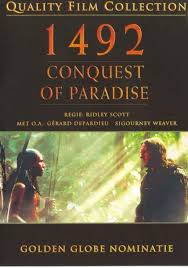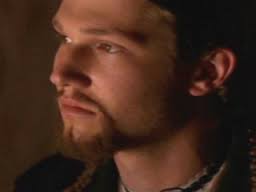Tags
1492: The Conquest of Paradise, Christopher Columbus, Gerard Depardieu, Latin America, Medieval Europe, Medieval Spain
In my previous comments on 1492: The Conquest of Paradise (1992, dir. Ridley Scott), I examined the way the film substantially misrepresents the life of Columbus in a variety of ways, particularly by trying to make it fit with American high school textbook accounts of Columbus and by trying to shift the blame for his misdeeds after he arrived in the Caribbean. But that analysis focuses on the film as a presentation of history.
The film actually wears a thin fig-leaf of protection against charges of historical inaccuracy. It has an undeveloped frame tale that presents the film as actually being based on a biography of Columbus written by his illegitimate son Fernando. It opens with a brief voice-over narrative of Fernando (Loren Dean), who recalls his father saying “Nothing that results from human progress is achieved by unanimous consent. And those who are enlightened before the others are condemned to pursue that light in spite of others.” (Needless to say, this is a fake quote from Columbus, not something he actually said. the concept of ‘human progress’ didn’t exist in the 15th century.)
The adult Fernando falls silent as the film shows Christopher (Gerard Depardieu) and Fernando sitting by the sea watching a ship sail out of sight. Periodically, Fernando figures in the story, though not in a very important way.
The film ends after Columbus’ third voyage. An older, unwell Christopher is seated in a chair looking out to sea. Fernando asks his father to tell him what he remembers and takes up a quill in preparation to take dictation. Christopher says “I remember…” and the film essentially ends as Fernando waits for him to continue.
By book-ending the film with these two moments of recollection, the film essentially tells us that it is not showing us history the way it actually happened, but rather history as Christopher and Fernando chose to present it.
Fernando did in fact write a biography of his father. Its rather long title gets shorted in English to The Life of the Admiral Christopher Columbus by his son Fernando. It was written more than 3 decades after his father’s death, and thus isn’t his father’s memoires in any real sense, but Fernando did have all his father’s papers and journals, and so had a great deal of material to work with in composing his father’s stories.
Fernando was writing with a purpose. He explicitly says that he is seeking to counter the negative stories that have circulated about his father. He objects to the claim that his father was of humble origins, and instead hints that he was descended from royalty. He seeks to refute the claim that other Spaniards had found the Caribbean before Columbus, and says, probably incorrectly, that his father attended a university as a young man. Overall, he wanted to present his father as a great man who had accomplished remarkable things, and he was supporting his brother Diego, who was embroiled in a lawsuit to recover some of their father’s property and legal rights.
As a result, the film consistently presents Columbus as a man who recognizes that he is doing something remarkable. He knows that he is an important historical figure. The quote at the start of the film is complete fabrication, but it is typical of Depardieu’s Columbus and his sense that he knows better than those around him, a sense that the film consistently reinforces, even when it’s wrong.
During his debate at the university of Salamanca, Christopher suggests that he considers himself a ‘chosen one’. Later, after he is recalled to Spain, he tells Sanchez, a resentful noble, that he has accomplished something that Sanchez, for all his nobility, could not do. At the end of the film, one of the university faculty members comments that Columbus has wasted his life, but Sanchez retorts that if either of them are remembered at all, it will be because of Columbus. So by the end of the film, Columbus’ sense of himself as a historically important figure is beginning to be recognized by those around him, most importantly his son Fernando.
If the film is meant to be Fernando’s biography of his father rather than an objective reporting of what happened, the film’s lapses into inaccuracy are less problematic, because they can be seen as Fernando eulogizing his father and trying to craft an image of him as a man who mattered.
However, the film’s frame-tale doesn’t really work. It’s too slight and undeveloped. The voice-over narrative that opens the film is never repeated, so the audience essentially forgets it and is only reminded right at the end of the film. Furthermore, the film can’t really be from Fernando’s point of view. At one point, Columbus himself briefly narrates the film, and on various occasions the film shows things that happen when Columbus is not present and could not possibly know about. Instead, it’s just a clumsy narrative technique that wasn’t well-thought-out.
Want to Know More?
1492: Conquest of Paradiseis available on Amazon.
If you want to read Fernando’s biography of his father, you can find it on Amazon as The Life of the Admiral Christopher Columbus: by his Son Ferdinand.





Pingback: 1492: Conquest of Paradise Makes Some Problematic Departures From Reality – Lights, Camera, History!